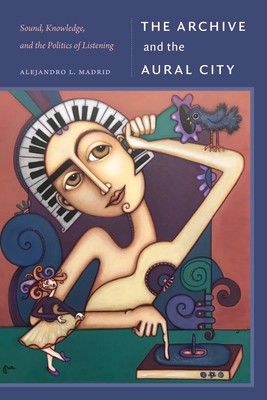
- We will send in 10–14 business days.
- Author: Alejandro L Madrid
- Publisher: Duke University Press
- ISBN-10: 1478028866
- ISBN-13: 9781478028864
- Format: 15.2 x 22.9 x 2.5 cm, hardcover
- Language: English
- SAVE -10% with code: EXTRA
Reviews
Description
In The Archive and the Aural City, Alejandro L. Madrid examines the possibilities for retrieving sounds from the archive that were not meant to be heard. Drawing on ÃÂngel Rama's notion of the Lettered City, Madrid proposes a notion of the Aural City--a Latin American urban intellectual elite for whom sound and listening are central to the creation, recreation, and circulation of new types of knowledge. While many of these elites carry forward a nationalistic agenda, Madrid contends that the Aural City's archives and the ways they are listened to and conceived through sound and music can also help dismantle dominant frameworks of national or colonial culture and build more inclusive spaces for intellectual exchange and political mobilization. From national archives in Latin America and colonial institutions abroad to sound exhibits, instruments, and internet-based archival projects, Madrid demonstrates how the development of urban spaces are understood through sound. In this way, he expands understandings of the archive's social and sonic power.
EXTRA 10 % discount with code: EXTRA
The promotion ends in 16d.17:12:49
The discount code is valid when purchasing from 10 €. Discounts do not stack.
- Author: Alejandro L Madrid
- Publisher: Duke University Press
- ISBN-10: 1478028866
- ISBN-13: 9781478028864
- Format: 15.2 x 22.9 x 2.5 cm, hardcover
- Language: English English
In The Archive and the Aural City, Alejandro L. Madrid examines the possibilities for retrieving sounds from the archive that were not meant to be heard. Drawing on ÃÂngel Rama's notion of the Lettered City, Madrid proposes a notion of the Aural City--a Latin American urban intellectual elite for whom sound and listening are central to the creation, recreation, and circulation of new types of knowledge. While many of these elites carry forward a nationalistic agenda, Madrid contends that the Aural City's archives and the ways they are listened to and conceived through sound and music can also help dismantle dominant frameworks of national or colonial culture and build more inclusive spaces for intellectual exchange and political mobilization. From national archives in Latin America and colonial institutions abroad to sound exhibits, instruments, and internet-based archival projects, Madrid demonstrates how the development of urban spaces are understood through sound. In this way, he expands understandings of the archive's social and sonic power.


Reviews